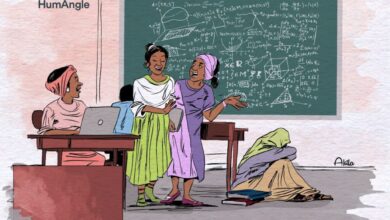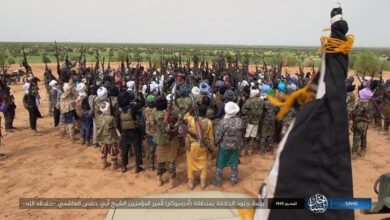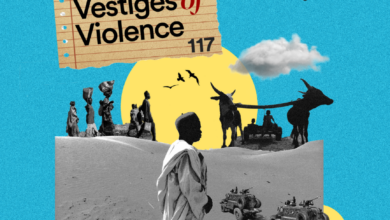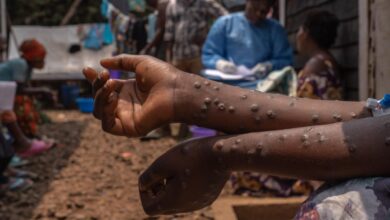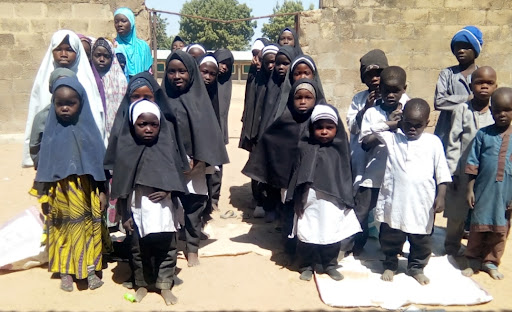
Years after escaping captivity from Boko Haram terrorists, Zarah Mohammed and Aisha Abba have returned to their reclaimed community, Bama, in Borno, Northeast Nigeria, to teach children whose displaced parents cannot afford their education.
Zarah and Aisha were both in their early teens in primary school when Boko Haram took over their town and held them captive about seven years ago. They both were lucky enough to escape. They had narrated to HumAngle how their abductors had repeatedly expressed their hate for formal education and the reason young girls like them could be killed if they showed any interest in going to school.
Out of captivity, the two girls had a chance to continue their education. They had even secured admission into the Borno State University but later had to drop out due to lack of funding.
Not giving up on their dreams, Zarah and Aisha returned to Bama, their ancestral home and a community reputed to have contributed the largest manpower to the terror groups, to continue their education at a college in the town. Aisha, an orphan, now lives with Zarah’s family.
Zarah had imagined that returning to Bama for her college education would provide an opportunity to help younger children, mostly orphans or wards of displaced parents, to acquire some form of literacy during evening classes. Her project is named the Zarah Integrating Learning Centre.
“Upon reaching Bama last year, I approached the headteacher of a public school and asked for permission from him to let me use his classrooms in the evening to teach children who are not enrolled in school to learn how to read and write,” she said.
“The idea is to stimulate their interests in education so that by the time they can read and count in English, maybe they will on their own, or through the help of their parents, be encouraged to continue in the formal education setting.”
Zarah, who has enrolled for an Accounting diploma programme at the town’s college, said the children also take some form of Islamic lessons.
“Lack of proper education is one of the main reasons why some people, especially the youth, easily fall for Boko Haram. Many of them were neither literates of western nor Islamic knowledge. It was a big problem for us in our community; and if we don’t do anything now to save and guide the younger ones, they too may follow the wrong path like others.”
Zarah said, while she was in an IDP camp, she saw many children who had no education. “They could neither read nor write and the way they see things are quite different, and that worries me a lot.”
Co-teaching with Aisha
Since their reunion after crossing paths during captivity and escaping at different times, Aisha and Zarah have become like sisters who share a similar passion for education and imparting knowledge to the younger ones.
“When I was in Maiduguri, Aisha admired the way I organised evening lessons for the kids in our neighbourhood, and when we both returned here in Bama, she decided to partner with me in organising the evening classes,” Zarah said.
The two girls take turns to teach the children, whose number has grown rapidly.
“We have about 60 of them that have enrolled so far,” Zarah told HumAngle. “We teach them how to identify alphabets, and how to count numbers, while some have even progressed in knowing how to spell the names of objects.”
Aisha said all of the pupils were Muslims, “so it was easy to teach the Quranic verses and other basic knowledge that kids needed to know about Islam.”
The girls believe that making the lesson classes an integrated one eases their tasks because it makes the community accept the idea.
“To some of the parents, the children are coming to our lesson classes for only Islamiyya, but to others, the kids are being taught western education. But what we noticed is that some of the parents were happy that their children can now count or recite English numbers.
“The most important thing that we want to achieve is making the children grow up to appreciate the need for education so that our community that has been badly destroyed can be better developed again.”
Challenges
As students, the two girls lack adequate resources to get basic instructional tools like chalks, books, and writing materials.
“We have no dependable means of income other than sewing and designing native caps. But, sometimes, we have to squeeze some amount out of the little income to buy things we need for the evening classes,” said Zarah.
“On the days we have no chalk to write on the instruction board, we simply teach verbally by chorus learning,” she explained.
Sometimes, the children do not attend classes due to a lack of what to eat. So, Zarah is forced to buy fried groundnuts to encourage them.
“To further encourage them, we told the parents to get some uniform or black veil for the girls. But not all of them could even afford that. So the last time UNICEF invited me for a programme in Maiduguri, they gave me an allowance of N15,000 and I was so happy because I used a substantial part of the money to buy cheap yards of clothes. We used this in sewing a uniform hijab for the girls and shirts for the little boys.”
Support Our Journalism
There are millions of ordinary people affected by conflict in Africa whose stories are missing in the mainstream media. HumAngle is determined to tell those challenging and under-reported stories, hoping that the people impacted by these conflicts will find the safety and security they deserve.
To ensure that we continue to provide public service coverage, we have a small favour to ask you. We want you to be part of our journalistic endeavour by contributing a token to us.
Your donation will further promote a robust, free, and independent media.
Donate Here
